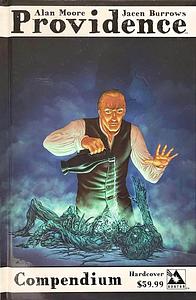You need to sign in or sign up before continuing.
Take a photo of a barcode or cover
70 reviews for:
Providence Compendium by Alan Moore and Jacen Burrows Hardcover
Alan Moore, Alan Moore, Jacen Burrows
70 reviews for:
Providence Compendium by Alan Moore and Jacen Burrows Hardcover
Alan Moore, Alan Moore, Jacen Burrows
challenging
dark
informative
mysterious
reflective
sad
tense
slow-paced
Plot or Character Driven:
A mix
Strong character development:
No
Loveable characters:
Yes
Diverse cast of characters:
Yes
Flaws of characters a main focus:
Complicated
Finished re-reading Providence recently. The first time I read it I felt quite strongly that it was one of Alan Moore's better works. Revisiting it has caused the series to really jump up the ranks. For comparison, I think Jerusalem is the finest thing Moore has ever penned with From Hell being a close second. However, I now feel Providence has taken that second spot.
Providence, like many of Moore's most interesting pieces, looks at a fundamental shift of human culture and the conditions of modernity as both a personal and greater shift in an individual personality. The modern, though it was beginning to form earlier, has its true awakening and is seen as a traumatic fissure in cultural identity after the horrors of the first world war and the greater violence that characterised the early 20th century. But, it is also narratively realised through the trauma of our central hero. For Moore, Lovecraft's unique and uniquely ubiquitous fiction is one particular manifestation of the modern. In this book Moore asks if art of fiction changes the world or if the world changes art or fiction, a simple question with a myriad answers all memorably visualised as the book hurtles to its incredible conclusion.
One thing, if you are going to read this it is very much necessary you are familiar with Lovecraft's work and have a general overview of his influence. This book is of course not an endorsement of Lovecraft's heinous view of the world, it is very much a counterpoint. There is also some genuine criticisms to be made about the length of the chapbook entries and the font used to bookend each chapter (Moore needed an editor there), however, you will be rewarded if you push through them and read.
Providence, like many of Moore's most interesting pieces, looks at a fundamental shift of human culture and the conditions of modernity as both a personal and greater shift in an individual personality. The modern, though it was beginning to form earlier, has its true awakening and is seen as a traumatic fissure in cultural identity after the horrors of the first world war and the greater violence that characterised the early 20th century. But, it is also narratively realised through the trauma of our central hero. For Moore, Lovecraft's unique and uniquely ubiquitous fiction is one particular manifestation of the modern. In this book Moore asks if art of fiction changes the world or if the world changes art or fiction, a simple question with a myriad answers all memorably visualised as the book hurtles to its incredible conclusion.
One thing, if you are going to read this it is very much necessary you are familiar with Lovecraft's work and have a general overview of his influence. This book is of course not an endorsement of Lovecraft's heinous view of the world, it is very much a counterpoint. There is also some genuine criticisms to be made about the length of the chapbook entries and the font used to bookend each chapter (Moore needed an editor there), however, you will be rewarded if you push through them and read.
Alan Moore is excellent at reinterpreting Lovecraft. The only complaint I have is that the series spends its whole time circling the outskirts of the horrors before diving straight into the eye in the final chapter. Bit of a jarring shift in tone. Looking forward to rereading it in the future.
adventurous
dark
mysterious
tense
medium-paced
Plot or Character Driven:
A mix
Strong character development:
Yes
Loveable characters:
No
Diverse cast of characters:
Yes
Flaws of characters a main focus:
Complicated
Builds to a fine, terrifying finish with lots of scares along the way. I've read lots of Moore, but this one stands tall as a measured work of research, fan service, and just plain old good storytelling. Definitely recommended, and holds up well rereading it a year later.
adventurous
challenging
dark
emotional
hopeful
inspiring
mysterious
reflective
medium-paced
Plot or Character Driven:
Character
Strong character development:
Yes
Loveable characters:
Yes
Diverse cast of characters:
Yes
Flaws of characters a main focus:
Yes
If you're a writer, especially of horror, I highly recommend Providence.
This book has layers that peel back and whisper secrets to the reader with an open mind. I didn't know very much about cosmic horror -- never cared for Lovecraft even -- but there is so much love for the genre and its history packed into this story that I found myself taking breaks between chapters to research the names, titles, and idioms as they came up. And I'm so glad I did! Robert Chambers, Lord Dunsany, and Sidney Sime are just a few of the artists I gained a new respect for after reading Providence.
Beyond its value as an historical study, the story is both fun and frightening. Certain aspects of it are disgusting and difficult to stomach, but there's also a subtlety to the characterization that creates this wonderful mysterious atmosphere that only thickens after the first chapter.
This book has layers that peel back and whisper secrets to the reader with an open mind. I didn't know very much about cosmic horror -- never cared for Lovecraft even -- but there is so much love for the genre and its history packed into this story that I found myself taking breaks between chapters to research the names, titles, and idioms as they came up. And I'm so glad I did! Robert Chambers, Lord Dunsany, and Sidney Sime are just a few of the artists I gained a new respect for after reading Providence.
Beyond its value as an historical study, the story is both fun and frightening. Certain aspects of it are disgusting and difficult to stomach, but there's also a subtlety to the characterization that creates this wonderful mysterious atmosphere that only thickens after the first chapter.
It's great to have the whole shebang of Providence in one handy and affordably priced collection, but I fear that many readers will suffer thanks to its lack of including The Courtyard and Neonomicon as the ending makes no sense without the context they provide. Outside of that, the Lovecraft backdrop that Moore uses as his setting for this exploration of the duality of nature and the underlying darkness of our lives and culture provides the perfect creepy atmosphere to bring forth the hidden truths he wants to illuminate.
challenging
dark
mysterious
tense
medium-paced
Plot or Character Driven:
Plot
Strong character development:
Complicated
Loveable characters:
No
Diverse cast of characters:
Complicated
Flaws of characters a main focus:
Yes
I don't know what I was expecting from this graphic novel, but it wasn't this. Lovely art style and that's the only reason it gets 2 stars instead of 1.
Graphic: Adult/minor relationship, Body horror, Genocide, Gore, Hate crime, Homophobia, Incest, Infidelity, Mental illness, Pedophilia, Rape, Self harm, Sexual assault, Sexual content, Sexual violence, Suicidal thoughts, Suicide, Torture, Transphobia, Violence, Xenophobia, Blood, Antisemitism, Trafficking, Religious bigotry, Medical trauma, Murder, Schizophrenia/Psychosis , Pregnancy, War, Injury/Injury detail
Please do yourself a favour and read the trigger warnings
Hm. A tough one this. One that probably requires a second reading to really decide whether it succeeds or not. Thoughts on a first reading then: it's dense. Jam packed with Lovecraftian lore and literary history, unfriendly to the casual reader looking for a solid horror yarn. On that count I'm not sure it succeeds, unlike the much shorter and tighter Neonomicon which packs a real gut punch, grotesque and unpleasant as that is.
Some of that may be down to Jacen Burrows accomplished but uninspired art which is great at setting place and the deliberate pace, but lacks the imaginative flair to pull off the "cosmic horror" - his renderings of Lovecraft's "unknowable" seem all too known and familiar at this point, which highlights the problem of most visual representations of the lore; without a truly deft touch and/or idiosyncratic vision to match Lovecraft's own, any depiction will fall well short of "vast, cosmic mystery" and belly flop into horror movie cliche. Lovecraft is often criticised for his reliance on vague adjectives, endless synonyms for "unfathomable" adding up to (for some) an authorial shrug: "well, you know, our pathetic human language just isn't up to the task, here, try 'indescribable corruption of natural law' on for size!", but of course he knew what he was doing, leaving it up to the reader themselves to figure out, or not.
Luckily Moore's writing and plotting is able to pick up some of that slack, nicely depicting the protagonist's growing disorientation while it feeds our own with some genuinely disquieting revelations, and one revolting pivotal scene which manages to cover every point on the perversity scale and a few even it didn't quite stretch to.
Of course Moore has some big ideas to tackle here, his major thesis apparently being that Lovecraftian lore and its offshoots represent a new, modern, North American (U.S.) folklore encompassing all that culture's ugliness, prejudice, and contradiction, and I suppose the buried fear of its ultimate futility. Pretty invigorating stuff! Most of this is spelt out in the protagonist's diary entries at the end of each (comic) chapter, and it's here that I think I had my biggest problem with the book. The effect of these entries for me on this first read was to bring the narrative to a shuddering halt, blowing up any tension and momentum earned in the more traditional comic book section preceding. They're a mixture of recap and expansion, very expository, and they often feel redundant, even vaguely condescending (true, this is one of the protag's characteristics) in that they sometimes feel as if Moore doesn't trust the reader to cotton on to what he's attempting, even though much of that is latent in the main narrative. And where it isn't, I couldn't help thinking well, why isn't it?
Which circles me back round to the beginning, and my feeling that a second read might be necessary to decide what purpose these interludes serve (Moore never seems anything but deliberate), and whether they work in that context to deepen the narrative. I definitely have a preference for horror in which the subtext (if you want to look) is buried within the story - I doubt Lovecraft himself had any idea at all of what he was doing (certainly that's Moore's contention in Providence) beyond writing the stories he was able to write by way of his own peculiar pathologies and prejudices, and that's their power for better or worse. I don't naturally incline myself towards Providence's kind of metatextual tom-fuckery, interesting as it is, so I lay that down as context for this review. Still, I am going to read this again.
Some of that may be down to Jacen Burrows accomplished but uninspired art which is great at setting place and the deliberate pace, but lacks the imaginative flair to pull off the "cosmic horror" - his renderings of Lovecraft's "unknowable" seem all too known and familiar at this point, which highlights the problem of most visual representations of the lore; without a truly deft touch and/or idiosyncratic vision to match Lovecraft's own, any depiction will fall well short of "vast, cosmic mystery" and belly flop into horror movie cliche. Lovecraft is often criticised for his reliance on vague adjectives, endless synonyms for "unfathomable" adding up to (for some) an authorial shrug: "well, you know, our pathetic human language just isn't up to the task, here, try 'indescribable corruption of natural law' on for size!", but of course he knew what he was doing, leaving it up to the reader themselves to figure out, or not.
Luckily Moore's writing and plotting is able to pick up some of that slack, nicely depicting the protagonist's growing disorientation while it feeds our own with some genuinely disquieting revelations, and one revolting pivotal scene which manages to cover every point on the perversity scale and a few even it didn't quite stretch to.
Of course Moore has some big ideas to tackle here, his major thesis apparently being that Lovecraftian lore and its offshoots represent a new, modern, North American (U.S.) folklore encompassing all that culture's ugliness, prejudice, and contradiction, and I suppose the buried fear of its ultimate futility. Pretty invigorating stuff! Most of this is spelt out in the protagonist's diary entries at the end of each (comic) chapter, and it's here that I think I had my biggest problem with the book. The effect of these entries for me on this first read was to bring the narrative to a shuddering halt, blowing up any tension and momentum earned in the more traditional comic book section preceding. They're a mixture of recap and expansion, very expository, and they often feel redundant, even vaguely condescending (true, this is one of the protag's characteristics) in that they sometimes feel as if Moore doesn't trust the reader to cotton on to what he's attempting, even though much of that is latent in the main narrative. And where it isn't, I couldn't help thinking well, why isn't it?
Which circles me back round to the beginning, and my feeling that a second read might be necessary to decide what purpose these interludes serve (Moore never seems anything but deliberate), and whether they work in that context to deepen the narrative. I definitely have a preference for horror in which the subtext (if you want to look) is buried within the story - I doubt Lovecraft himself had any idea at all of what he was doing (certainly that's Moore's contention in Providence) beyond writing the stories he was able to write by way of his own peculiar pathologies and prejudices, and that's their power for better or worse. I don't naturally incline myself towards Providence's kind of metatextual tom-fuckery, interesting as it is, so I lay that down as context for this review. Still, I am going to read this again.
challenging
dark
mysterious
reflective
tense
slow-paced
Plot or Character Driven:
A mix
Strong character development:
Complicated
Loveable characters:
No
Diverse cast of characters:
No
Flaws of characters a main focus:
Complicated
I discovered Lovecraft in the beginning of my 20's through a translated collection of his early short stories. I was at the time at a transition point, where my interest in the fantastic was emerging and having exhausted the limited offerings translated in my native language, I was slowly beginning to read whatever I could get my hands on in English.
Lovecraft's writings shaped my perceptions of Horror with his long winding descriptions, his refusal to name things plainly, always pitting the rationality of his protagonists against the unnamed and their insistence to not see that which is right there before their eyes right until the final pages where they are driven either to death or mad . In his world, the universe is cold and uncaring, we live our lives ignorant of the horrors lurking just outside the light and this is for the best because there can be no winning.
Moore's offerings on the other hand flesh out the horror, bringing it forward in graphic detail. Especially the 2 previous stories in the series, 'The Courtyard' as well as 'Neonomicon" feel like a slap in the face! 'Providence' is much more subdued, with the horror elements building up gradually and at least in my perspective requiring a good knowledge of Lovecraft's body of work to be able to be appreciated in full.
Finally, Moore has accomplished something unique here. he has managed to tie up Lovecraft's dreamland cycle with his Mythos stories in a consistent narrative, while at the same time demonstrating how books, language and pop-culture in general shape our perspectives and the world around us.
Lovecraft's writings shaped my perceptions of Horror with his long winding descriptions, his refusal to name things plainly, always pitting the rationality of his protagonists against the unnamed and their insistence to not see that which is right there before their eyes right until the final pages where they are driven either to death or mad . In his world, the universe is cold and uncaring, we live our lives ignorant of the horrors lurking just outside the light and this is for the best because there can be no winning.
Moore's offerings on the other hand flesh out the horror, bringing it forward in graphic detail. Especially the 2 previous stories in the series, 'The Courtyard' as well as 'Neonomicon" feel like a slap in the face! 'Providence' is much more subdued, with the horror elements building up gradually and at least in my perspective requiring a good knowledge of Lovecraft's body of work to be able to be appreciated in full.
Finally, Moore has accomplished something unique here. he has managed to tie up Lovecraft's dreamland cycle with his Mythos stories in a consistent narrative, while at the same time demonstrating how books, language and pop-culture in general shape our perspectives and the world around us.
Enjoyable, although the faux-handwriting sections are challenging to read. I need to revisit the Neonomicon to remind myself of the interlinks.
adventurous
challenging
dark
mysterious
tense
slow-paced
Plot or Character Driven:
A mix
Strong character development:
Yes
Loveable characters:
Complicated
Diverse cast of characters:
Yes
Flaws of characters a main focus:
Complicated



